The Central Sports Club of the Army (CSKA Moscow) had ruled the world of Soviet hockey with 32 championships in 48 seasons, including 13 in a row between 1977 and 1989. However, the fall of the Soviet Union in December of 1991 meant the once dominant club were no longer financed by the state and fell onto hard times - and in a big way.
That's when Baldwin saw an opportunity to combine savvy North American sports marketing with the best known club in the world outside of the NHL located in the largest city in Russia in an effort to not only make some money in the newly capitalist Russia, but also have the inside track on finding the best players Russia had to offer, which in 1993 was all the rage, as players such as Alexander Mogilny, Sergei Fedorov and Pavel Bure were tearing up the league.
The Red Army club was rechristened the "Russian Penguins" and a new logo was created to reflect the new arrangement with the recent back-to-back Stanley Cup champions.
In addition, staff from Pittsburgh was sent over to Moscow to oversee the club's transition to the modern, NHL way of selling the game by selling sponsorships and building private suites.
What could possibly go wrong?
The person sent over by the Pittsburgh was Stephen Warshaw, a sports marketing consultant given the responsibility to oversee the turnaround of the Russian franchise. Here is a fascinating interview with Warshaw from the PBS television series Frontline, which ran back in October of 1999.
Over the years, the Central Red Army team produced some of the greatest hockey players in history. What did you see when you got there?
Well, we first got there, the team was so downtrodden and so bankrupt that they couldn't even afford to buy jerseys for their teams. They had one set of uniforms for six different teams. So, one team would come off the ice, their jerseys ringing wet with sweat, and give it to the next guy, and he'd put it on. And I can't tell you how bad the locker room smelled, I mean you could smell that clear to Vladivastock from the East Coast of Russia. Very bad, and [North American hockey equipment manufacturer] CCM came to the rescue and provided all of our teams with jerseys. The youth teams, the big teams, and beautiful jerseys, and we bought them a washing machine, and they wanted their jerseys washed every game now. All of a sudden they were very concerned with hygiene after the washing machine and their new jerseys.
What happens to old Russian hockey players. . . I mean some of the great stars -- what was their stake when you get there?
Well, it's very sad. They retired making $5 a month, $10 a month.
These would be the Gretzkys of their --
The top stars of the day, this is the equivalent of the Espositos and Orrs, Bucyks, Howes, all the top guys. And basically the government has just left them for dead, and, pathetically, they show up at the arena drunk, very drunk just to get through the cold winters. Nobody knows where they live and it was sad. I mean we had one guy, Vikolaf, one of the legends of CSKA, double gold medal winner, had one of his fingers bitten off before one of the games by a bear that was making a between-periods promotion for us and he was drunk, he just kept pushing the bear saying: Ploho medved. Bad bear, bad bear. And the next thing his finger was gone. And there's no treatment for the players. There really should be, again, part of the NHL progra--there should be a veterans legends program to take care of all the great stars of Russia that the Soviet government denied any dollars to.
How did you manage to transform the environment of Russian hockey from that drab thing we remembered, to the glitz?
Well it was actually quite easy, because no one had tried it before. So there was no benchmark. We really had free rein to do everything. [Central Red Army Coach] Viktor Tikhonov at the beginning was very reticent to let us try out some of the promotions. And he took about a month until they let us actually do what we wanted to do.
What did you want to do?
Well, the opening night we wanted to have a woman come down on a rope, to start the game, give the puck to the referee. And I remember Viktor Tikhonov said to me, 'I'll only let you do it if you're the guy on the rope.' And I said okay, I'll do it, I know how to climb. He said--'Good, 'cause I'll be up there with a pair of scissors cutting you down.' So he had a good sense of humor, and I think that the cultural difference was big problem at first, but after a while they started to get a kick out of the insanity.
Tell me about the insanity, what kind of gimmicks did you come up with?
Well at the very beginning we had an empty building, so we had to fill it quickly. And everybody loves beer, around the world, so we had a few free beer nights from our big sponsor, Iron City Beer. We had strippers, we had all the normal things that attract men. As soon as the building was full, we started to gear up towards families. And that's when we could go to Disney, after we had the families. So we got rid of some of the real crazy stuff, and then we started to market very professionally, we would give premiums every night to the fans. We had car giveaways from Chrysler. We had trips to the United States to see the Stanley Cup finals courtesy of Delta Airlines. Every sponsor got in on it, and these were real big prizes. And even on the off nights we had free shaving cream and razors from Gillette. Even that was enough to draw fans.
And what went wrong?
We did it too well. And the criminal element started to come to our games, started to enjoy our games, started to evict our corporate sponsors out of their super boxes. And we had a real high class problem, we had too much interest, not enough super boxes. Our partners, Viktor Tikhonov and Valery Gushin were afraid to confront the mafia.
The mafia, these were like hoods?
These were guys with the sawed off shotguns down their long coats, and smoking away just like you'd imagine in movies, and this was sort of good news that we were attracting the money. Unfortunately, it was a rough crowd. My suggestion was--'Hey, let's build them their own super boxes, let's talk to them, and I'm sure they'd have no trouble paying the twenty-three thousand dollars for the season. ' And the comment that I got from my partners was--'You go ask them for the money, 'cause if you do, you're gonna be hanging from the rafters by your thumbs. . . '
When did you first become convinced of the reality of the danger of violence in Russia?
Personally, I had my heart skip a few beats at the end of the second season when one of the Mafia partners, with our Russian partners, came up to me and offered me a job with his company -- suggesting that I leave the Pittsburgh Penguins and work for them, that there was no need for the Americans anymore as long as I was there. And I asked him how much they'd pay me, uh, through a translator of course, and he didn't speak a word of English. And then finally, when I told him it wasn't enough money, he started to laugh. . . And he said well, we'll kill you for 6,500 dollars. I said 6,500 dollars for me? You shouldn't be paying more than three grand. He laughed, tweaked his neck, which means let's drink in Russian, and then started speaking perfect English to me for the rest of the night. Never saw him again.
Kill you for 6,500 bucks.
That's all.
You mentioned the fact that seeing the mafia at the hockey game. How did you know you were seeing mafia, they didn't wear jerseys?
I think the guns were a tip off...
Guns?
Long sawed-off shotguns, down their side of their coats. They travelled in groups, and beautifully dressed businessmen -- beautifully dressed with security forces. They'd come in with the limousines with the dark windows, disobeying our parking rules, disobeying our smoking rules, disobeying everything. And, basically, our partners said, Just back off, don't get involved here, we'll take care of this. And, again, we had no way of knowing if they were getting paid by the Mafia, or if they too were afraid. This is the issue.
How far did they go in terms of taking over the corporate boxes side of it. What happened there?
Well, basically we couldn't build the superboxes fast enough. We only had about eight to start, and we started selling them quickly to multinational corporations, to Ernst and Young, to Delta, to Philip Morris, to Coca Cola, all the major concerns that were sponsors. And they quickly got thrown out of their boxes, which I thought was a good problem, until I realised we couldn't even build the boxes for them. Our partners couldn't get it done quickly enough and, therefore, we were basically reneging on our sponsorship deals. And that's when I realised if we can't honor our commitments to our multinational sponsors, because of the Mafia's influence in taking over their prime seating, we're in trouble.
So they just walk into the box --
Took it --
Point a gun, somebody would say, "Get out."
They said this is our box, yeah, get out. That was it. We've had situations where we had Nike coming in from Germany and from Beaverton, and two in the morning I was paying a painter to spraypaint the Nike logo into the ice as part of their sponsorship deal. At eight in the morning it had been cut out of the ice by our partners. And I said, what are you doing? That's $100,000 to us, which you get $50,000. He said no one asked us for permission. This was when we knew we had a problem . . .
What about the killings, and how close were they to the hockey scene?
Well, it was frightening, in about a six month period, a player was killed on our team, Alexander Osache, who was a San Jose Sharks pick. The team assistant coach, Vladimir Bouvich, was killed. And our team photographer Felix Oliviov, were all killed. Two of them gunned down Mafia-style, five bullets to the head in front of their wives. The player, we're still not sure how he died. He died in his room, in his apartment . . .
When did you learn this fact of life about doing business in Russia?
Well it was always there. I think any time you have a new capitalist structure, there's always the chance for criminal elements. I mean, look at the the twenties in Chicago, with Prohibition, and this is the "Wild East." There's lawlessness, I've seen kiosk owners dragged out of their kiosks at high noon and beaten by four guys because they didn't pay their twenty percent to the mafia. Most mafias, as you know, the traditional image of a mafia is that they control certain industries. Construction, carting, the fish industry, contracting. However, in Russia, they don't really make anything. They just take everything. And they wanted twenty percent of everybody's action. And the tax police wanted their money. And then the minor criminals wanted their money. So it became impossible for companies to actually make money over there, because, by the time you sold the can of beer or a chocolate bar, it already cost more to bring it in than it does to sell it.
So, are you telling me that like this remarkable marketing success, was written off in a matter of months?
We had two really beautiful seasons, and we were lucky enough to get some great media from all over the world. German television, Canadian television, the US was very high on it. Disney came in, I think that was the biggest part of the whole deal is when Disney became our partner. And then I think the problem was after the second year they felt that they learned enough from us, they saw how we did it, and they figured they could take over. Why cut us in for fifty percent when they could have the whole thing? And I think it was at the end of the second season that we knew that we were ghosts. We were dead.
We, being?
The Pittsburgh Penguins.
Did it ever cross anybody's mind to basically tell these people to go away?
Well. You can't do that over there. It's their country. And we always had to realize that we were the imperialist capitalist dogs that Stalin and Brezhnev and Lenin and everyone had told the Russians that we were. We had to be on best behavior. And we had to respect the authorities; we had to respect everyone over there. As a matter of fact that's why we became successful, is because we paid tribute to all the deceased legends of the Red Army. Guys that had never received ten dollars from the government, and we retired their jerseys, brought their widows onto the ice, their children. And in Russia, remember, it was never about individuals, it was always the team. And it was a system, it was a machine, an evil machine that would dehumanize people. So what we did is we started to make people human. To show the human side, through promotions, through entertainment at our games. And I think it was too much of a good thing too fast.
So, tell me, what did you think when the guys with the shotguns showed up?
I wondered if they were kalashnikovs or American made, I didn't know at first. I naively went up to these big guys in the super boxes owned by Philip Morris and I asked them if I could help them. And they just sort of laughed at me. And I brought Sergei Starykof's kid who was eight years old with me so that they really couldn't do much in front of a little kid. And [the kid] said to me, Steven, I don't think you're gonna wanna hear what they're saying in Russian. And I said, No, tell me. And that's when I realized that we became so popular so fast, that we really had no safeguard against this criminal element. We did bring in security, but you gotta understand that the security forces in Russia, the police, are ineffective, they're useless against the new rich, the new Russians. They have their own security forces that come into the building hours in advance, check it out, make sure it's okay for their big guns to come in.
I heard that they actually bought [advertising] space on the boards [around the rink]. What was that all about?
Well it's very strange. We had a deal with the partners that we would sell about eighty percent of the rink boards and leave twenty for them to sell. Because we wanted to have Russian sponsors, not just multinationals. And one game I looked down and I saw a company that I'd never heard of. And I asked one of our partners -- who is this? What do they make? He said, Don't ask. Again, you'll be hanging from the rafters by your thumbs. And this became sort of the easy way out for our partners that if something was a problem, it was always mafia. So we never knew if it was a hundred percent mafia, fifty percent mafia, or perhaps made up by greedy partners, we could never really find out.
You're talking partners Tikhonov and Gushin.
Right.
These weren't boy scouts.
No.
Tough guys.
These are hard-line Communist.
And how big a part of the problem were they?
Well, I think that at the very beginning, they really had to swallow a lot of pride, to get the cash from the Pittsburgh Penguins. And it really hurt them in a strange way, to see the building full. They were happy that they were making money, but they were embarrassed that it took Americans to come in to Russia and show them how to do it. And I think that success really hurt us. I mean it happened so fast. I remember one great story when I first got there. That Valery Gushin said to me that--'not even Jesus Christ could fill this building.' And I remember two months after the opening game, against Dynamo, we were full. And I went up to him, I said -- 'Have you seen a guy with long hair and sandals? ' And he didn't laugh. You know. This is -- there's no humor in Russia. No matter how evil rival factions are, they're always more attractive than the Americans.
What impact did this have on this little brief hockey renaissance that you saw?
Well it killed the future of Russian hockey, and the [NHL/Russian] partnerships, because the Detroit Red Wings were watching us very intently. Michael Ilitch who owns Little Caesars and the Detroit Red Wings had already put a restaurant in Prague, and he was already looking at Moscow and we figured what a perfect venue to introduce his pizza. So they sent their staff over to Moscow to consider purchasing the Krilya Sovietov team which is the Soviet Wings, a perfect match with the Red Wings. And they got greedy. Which seems to be the problem for the country is that the greed is so great, they asked for five million dollars from the Detroit Red Wings. [The Red Wings] countered with a million. Which was a million more than we gave to the Red Army -- we only gave them marketing dollars, and expertise. And they left. The Russians got too greedy, they didn't take the million, and, today, they owe money, and there's tax collectors and bill collectors and no fans. And again, this is, I think, the biggest tragedy: I think that everybody was watching the Penguins and the Red Army and if this worked, perhaps every Russian elite team would have an NHL affiliate. But they killed the goose.
Didn't the NHL also kill the golden goose by taking the best players developed under the Soviet system and not doing anything to cultivate a future crop of promising Russian players?
Well, I think the NHL has lost its conscience. I think that they have neglected their responsibility to replacing the trees that they've cut down in Russia. It's not different than a rain forest that's been denuded by a greedy paper company, and they leave for the next rain forest. And I think it's very shortsighted by the NHL, considering that almost twenty percent of the players in the league are from the former Soviet Union, including the top stars of the game. I think that American business is sort of a slash and burn, rape and pillage mentality, just to get you to the next quarter for your stockholders' meeting. And I think that from the commissioner on down to the general managers, they have to succeed each quarter. They don't think about five, ten years from now. Russia] used to be a hatchery for the NHL. They would just breed 'em, like little fish. And now, the hatcheries are drying up.
Today's featured jersey is a 1993-94 Russian Penguins Sergei Brylin jersey as worn during the Russian Penguins schedule of games against teams from the IHL. These CCM jerseys are miles ahead of the standard lightweight mesh jerseys with sublimated or heavily screen printed logos worn by teams during the days of the Soviet Union.
Brylin, born on this date in 1974, was drafted by the New Jersey Devils in the 1992 NHL Draft. He came to North America for the 1994-95 season and first played for the Albany River Rats of the AHL while the NHL season was delayed by labor issues. He then joined the Devils once the season got underway, playing in 26 of their 48 games. He also was active for 12 of the Devils 20 playoff games, which concluded with the Devils winning the Stanley Cup in Brylin's first season in the NHL!
He would eventually play 13 seasons for the Devils before returning to Russia in 2008-09 with SKA St. Petersburg for three seasons prior to joining Metallurg Novokuznetsk for 2011-12. In all, he played in 765 NHL games, scoring 129 goals and 308 points and would win Stanley Cups again in 2000 and 2003.
While the formal arrangement with the Pittsburgh Penguins came to an end after two seasons, the Russian Penguin logo continued on for many years - and in a most confusing manner, which will be the subject of tomorrow's entry - "The Civil War - A Tale of Two Teams With the Same Name."

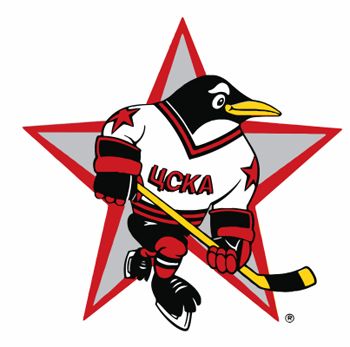
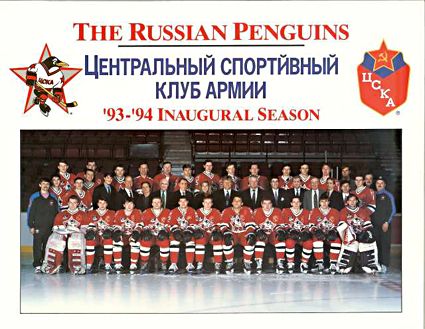
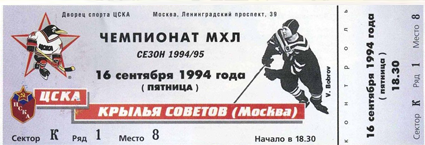
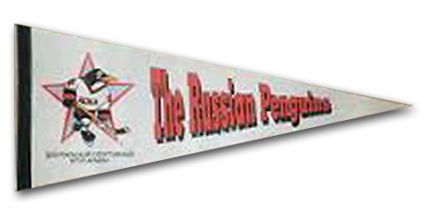
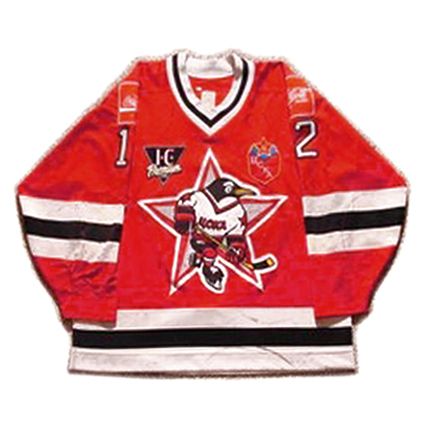
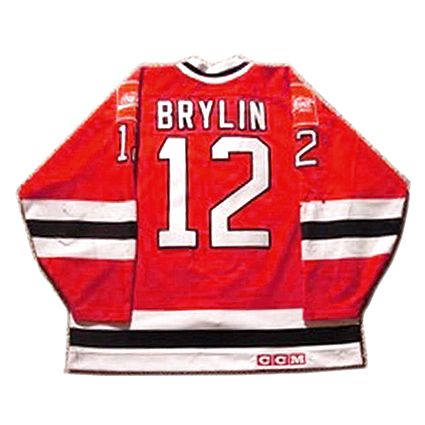
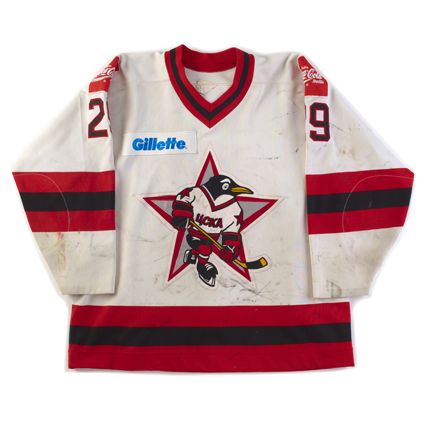
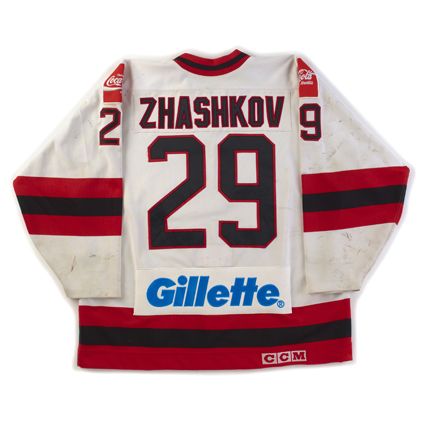










I read every post on here but rarely comment. This post forced my hand, lol! Great job on this topic! I had never heard that Frontline interview but I remember this little venture back when it was happening. I grew up in Pittsburgh and was still living there at the time. I remember the uneasiness in conversations about the Russian team. Can't wait for the "Civil War" post.
ReplyDeleteThanks for the compliment. We appreciate you taking the time and it's always a good reward to generate a response from something you liked.
ReplyDeleteHopefully tomorrow's post is nearly as entertaining.
this is an unbelievable insight into a part of hockey history that is not only almost completely unknown to the average hockey fan but a shocking revelation into to the corruption in a major hockey league and the death of a potential partnership between russian and north american hockey. Stephan Warshaw must have been shitting his pants when talking to the russian mobster about how much he'd kill him for. thanks for the great post!
ReplyDeleteFascinating! I had no idea what actually happened with the Russian Penguins. Brilliant post. Thanks for all of this (and all other posts for that matter)!
ReplyDeleteI have a Russian Penguins jersey in my closet and I was looking them up on Google as I wondered what happened to the team. Great interview! Crazy stuff!
ReplyDeletei have a question I am wondering if you have any details of when the russian penguins played in canada against the Jr A hockey teams in the min 90s, I met the team and have a signed pennant with the coach, assistant coach and the team, there was even security for the team cause rumours one player wanted to leave russia and defect to canada there where alot of players who wanted to leave and if i remember Sergei Samsonov was there too trying to identify the signatures as it was over 25 yrs ago when I got this if anyone can help please contact me felix@personainternet.com and I can send you a photo of the pennant
ReplyDeleteThey've just released a film about Russian Penguins. Check it out. It's really wild and well made. Called Red Penguins though. I've watched it on Amazon Prime but i think it's also available on iTunes, google play and on demand.
ReplyDeletehttps://www.youtube.com/watch?v=W90-iWQkExE